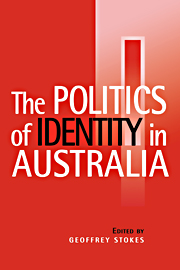Book contents
- Frontmatter
- Contents
- Acknowledgements
- Contributors
- Introduction
- Theorising Identity
- Gender and Sexuality
- Race, Place and Citizenship
- Culture: Literature and Film
- 12 Political Identity in Contemporary Australian Literature: David Malouf and Peter Carey
- 13 Australian Film and National Identity in the 1990s
- References
- Index
12 - Political Identity in Contemporary Australian Literature: David Malouf and Peter Carey
Published online by Cambridge University Press: 05 June 2012
- Frontmatter
- Contents
- Acknowledgements
- Contributors
- Introduction
- Theorising Identity
- Gender and Sexuality
- Race, Place and Citizenship
- Culture: Literature and Film
- 12 Political Identity in Contemporary Australian Literature: David Malouf and Peter Carey
- 13 Australian Film and National Identity in the 1990s
- References
- Index
Summary
Much has been written about Australian national character and national identity. Images of the latter have often been based upon responses to the Australian landscape, generally perceived as hostile, as a place of exile as well as emancipation. Bush heroes have commonly been depicted as men who survived the hardships and hostility of the Australian outback through courage, stamina, independence and rejection of authority, but especially mateship. As national icons the bushman and later the ‘digger’ (a term for active and returned soldiers) have been Anglo and male, and as such have contributed to a narrow masculinist conception of Australian national identity (Turner 1986 and, especially, Shaffer 1988). Two major Australian authors, David Malouf and Peter Carey, each challenge these characterisations – in different ways – in recent novels. Those challenges are the focus of this essay.
While questions of national character and identity have political implications, political identity itself, as opposed to individual identity or social or cultural identity, has received little attention in Australia, especially before the recent public debate on republicanism and the so-called ‘millennium fever’ over possible changes to the Constitution. In an attempt to make clear and concrete the political (and not just the cultural) nature of the identity discussed in this chapter, two classical political science texts are invoked to ground but hopefully not to constrain this discussion: W.J.M. Mackenzie's Political Identity (1978) and Almond and Verba's The Civic Culture (1963).
- Type
- Chapter
- Information
- The Politics of Identity in Australia , pp. 175 - 184Publisher: Cambridge University PressPrint publication year: 1997
- 1
- Cited by

